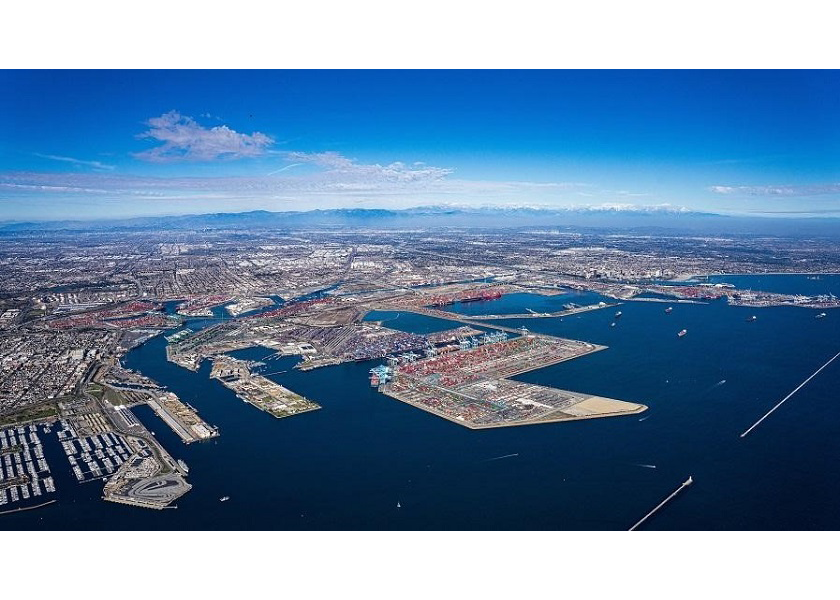Ocean Shipping Reform Act passes the U.S. House of Representatives

Legislation that seeks to reform policies that have resulted in delays in product delivery and backlog at key ports has been passed by the House of Representatives, and industry advocates promise to lobby the Senate to act on the legislation.
The House of Representatives voted to pass the Ocean Shipping Reform Act of 2021 on Dec. 8 by a vote of 364 to 60.
“Passage of this legislation in the House of Representatives with such resounding bipartisan support is a testament to the efforts of leaders throughout the fresh produce industry to speak with one voice on the need for reform to our current system," United Fresh President and CEO Tom Stenzel said in an update. “We look forward to working with Democrats and Republicans in the Senate to get this important piece of legislation passed quickly.”
According to bill sponsor Rep. John Garamendi, D-Calif., a senior member of the House Committee on Transportation and Infrastructure, the legislation would:
- Establish reciprocal trade to promote U.S. exports as part of the Federal Maritime Commission’s (FMC) mission;
- Require ocean carriers to adhere to minimum service standards that meet the public interest, reflecting best practices in the global shipping industry;
- Require ocean carriers or marine terminal operators to certify that any late fees —known in maritime parlance as “detention and demurrage” charges—comply with federal regulations or face penalties;
- Shift burden of proof regarding the reasonableness of “detention or demurrage” charges from the invoiced party to the ocean carrier;
- Prohibit ocean carriers from declining opportunities for U.S. exports unreasonably, as determined by the FMC in new required federal rulemaking; and
- Require ocean common carriers to report to the FMC each calendar quarter on total import/export tonnage and twenty-foot equivalent units (loaded/empty) per vessel that makes port in the U.S.
Congress last overhauled the Federal Maritime Commission’s authority to regulate the global ocean shipping industry under the Ocean Shipping Reform Act of 1998, Garamendi said in a news release.
The People’s Republic of China was granted permanent normal trade relations with the United States, so-called “most-favored nation” status, in December 2001 following the country’s admission to the World Trade Organization.
The lawmaker said that in 2001, the U.S. trade imbalance with the People’s Republic of China was approximately $83 billion in nominal dollars, according to the U.S. Census Bureau. In 2020, our trade imbalance with mainland China was $310 billion.
Garamendi said the legislation will make the Federal Maritime Commission (FMC) a more effective federal regulator.
The Ocean Shipping Reform Act will ensure a more competitive global ocean shipping industry, protect American businesses and consumers from price gouging, and establish reciprocal trade opportunities to reduce the U.S. longstanding trade imbalance with export-driven countries like mainland China, he said in the release.
“Access to the American market and its consumers is a privilege, not a right,” Garamendi said in the release. “Congress must restore balance at our ports and tackle the longstanding trade imbalance our nation has with China and other countries head on. I am pleased that the Ocean Shipping Reform Act has passed the U.S. House of Representatives with overwhelming bipartisan support, bringing us one step closer to protecting American consumers and businesses from price gouging by foreign-flagged ocean carriers. I continue working with my Republican colleague, Congressman Dusty Johnson of South Dakota, to enact our bipartisan bill into law."
Agricultural, retail and produce groups have endorsed the legislation include:
- Agriculture Transportation Coalition;
- American Farm Bureau Federation;
- National Retail Federation;
- American Trucking Associations;
- Agricultural & Food Transporters Conference;
- National Association of State Departments of Agriculture;
- National Council of Farmer Cooperatives;
- National Onion Association;
- Truckload Carriers Association;
- United Fresh Produce Association;
- California Farm Bureau Federation;
- California Citrus Mutual;
- California Fresh Fruit Association;
- California Table Grape Commission; and
- Western Growers Association.







